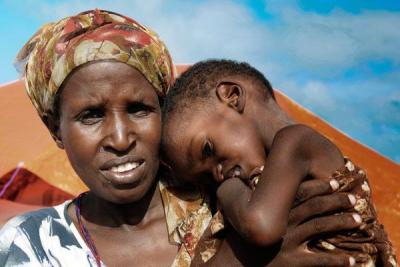Famine caused by delayed response

ROME -- As many as 100,000 people who died due to famine in East Africa would have survived if U.N. Agencies and other international aid organisations had responded better to the early warnings of crisis, according to humanitarian organisations and experts.
A report produced by Oxfam and Save the Children, as well as a round table of experts have found that the response to early warnings was inadequate and stated that the food crisis in the Horn of Africa, which still affects more than 13 million people, could have been averted.
The report, entitled ‘A Dangerous Delay’, stated that “There were clear early warning signs many months in advance, yet there was insufficient response until it was far too late. Governments, donors, the UN and NGOs need to change their approach to chronic drought situations.”
UN Emergency Relief coordinator, Jan Egeland, said in the foreword to the report that “The greatest tragedy is that the world saw this disaster coming but did not prevent it. Early signs of an oncoming food crisis were clear many months before the emergency reached its peak. Yet it was not until the situation had reached crisis point that the international system started to respond at scale.
Forecasts of the crisis were published as early as August 2010, when the Famine Early Warning Systems Network (FEWSNET) issued a special report which stated that bad rains predicted for East Africa could have “far-reaching and significant consequences,” and said that Southern Somalia would be among the most affected regions.
These warnings were stepped up in November, when the Food Security and Nutrition Working Group (FSNWG) called for “alarm and action.” The Group stated that “pre-emptive action is needed to protect livelihoods and avoid later costly lifesavings emergency interventions.” In February, the word famine began to appear, and reports in March spoke of an “existing crisis.”
But the response of the international humanitarian community did not reflect the crisis until aid to the region was dramatically increased after July 20, 2011, when the UN declared a famine in South Central Somalia, nearly a year after the first warning signs of were published.
A round table discussion held in the Rome headquarters of the United Nations Food and Agricultural Organisation on the Somalia famine saw experts from FAO, WFP, UNICEF and early warning organisations discuss “the imperative to improve” crisis response.
There was a consensus there that the response had not been rapid enough. Several of the experts, including Professors Dan Maxwell and Steven Devereux, spoke of the dangerous “normalisation of crisis,” which lead the Western World to get “too used toseeing awful rates of malnutrition and mortality rates.”
In addition, humanitarian organisations were described as having a “strong culture of risk aversion,” by Luca Alinovi, head of office for FAO Somalia, who said they demanded impossibly high levels of certaintyfrom the early warning systems before committing to providing aid.
The report also found that decision makers waited too long to provide assistance because they were waiting for certainty, “thus risking the loss of lives and livelihoods and ultimately spending more money on response. It continues “All actorsneed to review their approach to drought prevention and not wait for certainty before responding. A wait-and-see approach may be devastating in terms of lives and livelihoods.”
Both the report and the discussion noted the great difficulties faced by WFP in transporting aid to Somalia, given the very restricted access to the country, but nonetheless could find no excuse for the delayed response to the warnings.
Steven Devereux, research fellow at UK Institute for Development Studies, stated at the FAO round table discussion that every famine should in this day and age be preventable. He stated that famines are now “actions or inactions of man,” they cannot be blamed on natural causes, because the world is able to help. “in every single case, famines can be predicted and in almost every case, they are preventable.”
The Oxfam and Save the Children report also that that “although brought on by drought, it was human factors which turned the crisis into a deadly emergency.”


